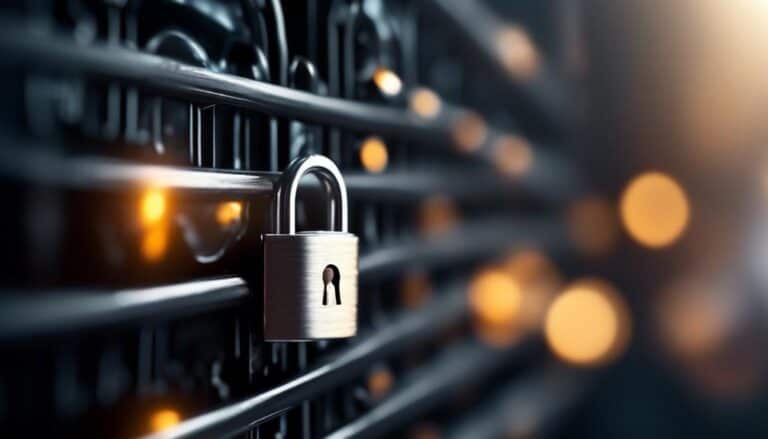Secure Your Online Presence With Expert Server Maintenance Tips
Imagine your online presence as a fortress, the walls strong and impenetrable, protecting your valuable information from any potential threats. But just like any fortress, it requires regular maintenance and upkeep to ensure its security remains intact.
In this ever-evolving digital landscape, staying one step ahead is crucial. So, how can you ensure the safety of your online presence? By following expert server maintenance tips that will fortify your defenses and safeguard your data.
From regular software updates to implementing strong password policies, this discussion will provide you with valuable insights and actionable steps to keep your online fortress secure.
Key Takeaways
- Regularly update server software and implement strong password policies to enhance security and protect against vulnerabilities.
- Implement two-factor authentication to add an extra layer of security for user authentication.
- Regularly backup server data to ensure data safety and quick recovery in case of failures or cyber-attacks.
- Monitor server performance and configure firewalls to detect and respond to security incidents, optimize resource allocation, and ensure prompt user request handling.
Regular Software Updates

To ensure optimal performance and security, regularly update your server software. Regular server maintenance is crucial for the smooth operation of your server. One of the most important aspects of server maintenance is keeping your software up to date. Software updates are essential for a variety of reasons.
First and foremost, software updates often include patches and bug fixes that address known vulnerabilities. Hackers are constantly looking for weaknesses in software, and outdated software is a prime target. By regularly updating your server software, you can stay one step ahead of potential security breaches.
In addition to security, software updates also bring performance improvements. Developers are constantly working to optimize their software, making it faster and more efficient. By keeping your software up to date, you can benefit from these performance enhancements and ensure that your server is running at its best.
Lastly, software updates often introduce new features and functionalities. These updates can enhance your server's capabilities and provide you with new tools to streamline your operations. By staying up to date with software updates, you can take advantage of these advancements and stay ahead of the competition.
Implement Strong Password Policies
To ensure the security of your server, it's essential to implement strong password policies. This includes setting password complexity requirements such as using a combination of uppercase and lowercase letters, numbers, and special characters.
Additionally, regular password updates should be enforced to prevent the use of outdated or compromised passwords.
Another effective measure is implementing two-factor authentication, which adds an extra layer of security by requiring users to provide a second form of verification, such as a code sent to their mobile device.
Password Complexity Requirements
Implement strong password policies to ensure the security of your server.
One crucial aspect of password policies is setting up password complexity requirements. By following password strength guidelines and emphasizing the importance of password hygiene, you can significantly enhance your server's protection against unauthorized access.
Consider implementing the following password complexity requirements:
- Require a minimum password length of at least 8 characters.
- Enforce the use of a combination of uppercase and lowercase letters.
- Mandate the inclusion of at least one numeric or special character.
- Regularly prompt users to update their passwords to prevent password reuse.
Regular Password Updates
Regularly updating passwords is essential for maintaining strong password policies and ensuring the security of your server.
Password hygiene is crucial in protecting your online presence from potential threats. By regularly updating your passwords, you mitigate the risk of unauthorized access to your server and sensitive data.
Implementing a strong password policy involves setting requirements for password complexity, such as using a combination of uppercase and lowercase letters, numbers, and special characters.
However, remembering complex passwords can be challenging. This is where password managers come in handy. Password managers securely store your passwords and generate strong, unique passwords for each of your accounts. They eliminate the need to remember multiple passwords and reduce the risk of password-related vulnerabilities.
Using a password manager can significantly enhance the security of your server and streamline the password update process.
Two-Factor Authentication
Using two-factor authentication is a highly effective method for implementing strong password policies and enhancing the security of your server. It adds an extra layer of protection by requiring users to provide two different forms of authentication before granting access. Consider incorporating the following measures to strengthen your server's security:
- Multi-factor authentication: Implement a two-step verification process that combines something you know (like a password) with something you have (like a security token or a mobile device).
- Biometric authentication: Utilize biometric data, such as fingerprints or facial recognition, as an additional factor for authentication.
- Time-based one-time passwords: Generate unique passwords that expire after a specific timeframe, reducing the chances of unauthorized access.
- Backup codes: Provide users with backup codes that they can use in case they're unable to access their primary authentication method.
Conduct Regular Backups
To ensure the safety and integrity of your server data, conducting regular backups is crucial. Backups serve as a failsafe in case of data loss or system failures, providing you with a way to restore your server to a previous state.
The frequency of backups will depend on the nature of your server and the importance of the data it holds, but it's generally recommended to perform backups on a regular basis, such as daily or weekly.
Additionally, consider the various backup storage options available, such as external hard drives, cloud storage, or network-attached storage (NAS), to ensure redundancy and accessibility.
Importance of Backups
Backups are an essential component of server maintenance, ensuring the security and integrity of your data. Here's why they're so important:
- Data recovery options: Backups provide you with multiple options to recover your data in case of a server failure or data loss. Whether it's a hardware failure, a software glitch, or a cyber attack, having backups gives you peace of mind knowing that you can easily restore your data.
- Importance of off-site backups: Storing backups off-site is crucial to protect your data from physical disasters like fires, floods, or theft. By keeping your backups in a separate location, you minimize the risk of losing both your server and backups simultaneously.
- Protection against human errors: Accidental deletion, overwriting files, or making irreversible changes are human errors that can happen. Backups act as a safety net, allowing you to retrieve previous versions of your data and undo any mistakes.
- Quick recovery time: Backups enable you to recover your data quickly, minimizing downtime and ensuring continuity in your operations. With a reliable backup system in place, you can easily restore your server to its previous state and get back to business without significant disruptions.
Frequency of Backups
Regularly conducting backups is essential for maintaining the security and integrity of your server data. The frequency of backups depends on your specific needs and the importance of your data.
A general rule of thumb is to perform backups at least once a day to ensure data retention and enable efficient disaster recovery. However, certain applications or industries may require more frequent backups, such as hourly or even real-time backups.
It's crucial to consider the size of your data, the frequency of changes, and the potential impact of data loss when determining the backup frequency.
Backup Storage Options
Consider various backup storage options to ensure the safe and reliable preservation of your server data. Here are four options to consider:
- Cloud Storage Options: Utilize cloud storage services such as Amazon S3, Google Cloud Storage, or Microsoft Azure. These platforms offer scalable storage solutions that are accessible from anywhere and provide reliable data protection.
- External Hard Drives: Invest in external hard drives to create physical backups of your server data. These portable devices offer large storage capacities and can be easily disconnected and stored in a secure location.
- Network Attached Storage (NAS): Set up a NAS device on your network to create centralized backup storage. NAS devices offer high-capacity storage and can be accessed by multiple devices simultaneously.
- Data Recovery Services: Consider partnering with a data recovery service provider. These professionals have the expertise to retrieve data from failed or damaged server hardware, ensuring that your critical information is recovered in case of a disaster.
Use a Reliable Firewall
To enhance the security of your server, ensure that you utilize a reliable firewall. A firewall acts as a barrier between your server and potential threats, monitoring incoming and outgoing network traffic. It helps prevent unauthorized access, protects against malicious attacks, and safeguards sensitive data.
When configuring your firewall, it's crucial to follow best practices. First, define a clear security policy that outlines what traffic is allowed and what's blocked. Regularly review and update this policy to adapt to changing security requirements. Additionally, consider implementing a default-deny rule, which blocks all traffic unless explicitly allowed. This approach minimizes the risk of unauthorized access.
Another important aspect of firewall configuration is the use of access control lists (ACLs). ACLs allow you to control which IP addresses or networks are granted access to your server. Only allow access from trusted sources and restrict access to specific ports or services that are necessary for your server's operation.
Regularly monitoring and analyzing firewall logs is vital for detecting and responding to potential security incidents. Analyzing logs can help identify suspicious activity, such as repeated failed login attempts or unusual traffic patterns. By promptly addressing these issues, you can mitigate the risk of a successful attack.
Monitor Server Performance

Monitoring server performance is essential for maintaining the optimal functionality and efficiency of your server. By implementing effective server monitoring practices, you can ensure that your server is running smoothly and identify any potential issues before they become major problems.
Here are four key aspects to consider for server monitoring:
- Resource utilization: Keep an eye on CPU, memory, disk, and network utilization to ensure they're within acceptable limits. Monitoring these resources will help you identify any bottlenecks and take necessary actions to optimize performance.
- Response time: Constantly monitor the response time of your server to gauge its performance. This will help you identify any latency issues and ensure that your server is responding promptly to user requests.
- Error rates: Monitor error rates to identify any potential issues with your server's software or hardware. High error rates could indicate problems that need attention, such as software bugs or hardware failures.
- Traffic patterns: Analyzing traffic patterns can provide insights into the usage patterns of your server and help you optimize its performance accordingly. Understanding peak usage times and user behavior can help you allocate resources effectively.
Implement Ssl/Tls Certificates
Are you ready to enhance your server's security and protect sensitive data by implementing SSL/TLS certificates?
Implementing SSL/TLS certificates is an essential step in securing your online presence. SSL/TLS certificates encrypt the communication between your server and clients, ensuring that sensitive data such as passwords, credit card information, and personal details are transmitted securely.
To ensure the smooth implementation of SSL/TLS certificates, it's important to follow certificate management best practices.
Firstly, choose the right SSL/TLS provider. Look for providers that offer strong encryption algorithms and support the latest TLS versions. Consider factors such as reputation, customer support, and pricing when making your decision. Additionally, evaluate the provider's certificate lifecycle management capabilities, including the ease of certificate issuance, renewal, and revocation.
Secondly, follow certificate management best practices. Regularly update and renew your SSL/TLS certificates to ensure that you're using the latest security protocols. Keep track of certificate expiration dates and set up automatic renewal processes to avoid any downtime or security vulnerabilities. Implement a robust certificate management system to monitor and manage all your certificates effectively.
Frequently Asked Questions
How Often Should Regular Software Updates Be Performed on a Server?
Regular software updates should be performed on your server frequently to maintain its security and functionality. These updates are important in ensuring that your online presence remains secure and protected from potential vulnerabilities.
What Are Some Best Practices for Creating Strong Passwords?
To ensure strong password security, follow these best practices: use a combination of uppercase and lowercase letters, numbers, and special characters; avoid using personal information; and regularly update your passwords.
How Frequently Should Backups Be Conducted to Ensure Data Security?
To ensure data security, backup your data frequently. This will protect against potential loss or corruption. Consider using different storage options, such as cloud storage or external hard drives, to keep your backups safe.
What Features Should a Reliable Firewall Have to Protect a Server?
When it comes to server protection, a reliable firewall should have features like intrusion detection and prevention, VPN support, and customizable rule sets. These features help ensure the security of your server and keep potential threats at bay.
How Can Server Performance Be Effectively Monitored to Detect Any Potential Issues?
Use server monitoring tools to effectively monitor server performance. These tools can detect potential issues, allowing you to proactively troubleshoot and maintain optimal performance.
Conclusion
To safeguard your online presence, follow these expert server maintenance tips.
- Keep your software up to date
- Enforce strong password policies
- Regularly backup your data
- Utilize a reliable firewall
- Monitor server performance
Additionally, implementing SSL/TLS certificates will enhance your security.
By adhering to these practices, you can protect your server from potential threats and ensure the safety of your online activities.








